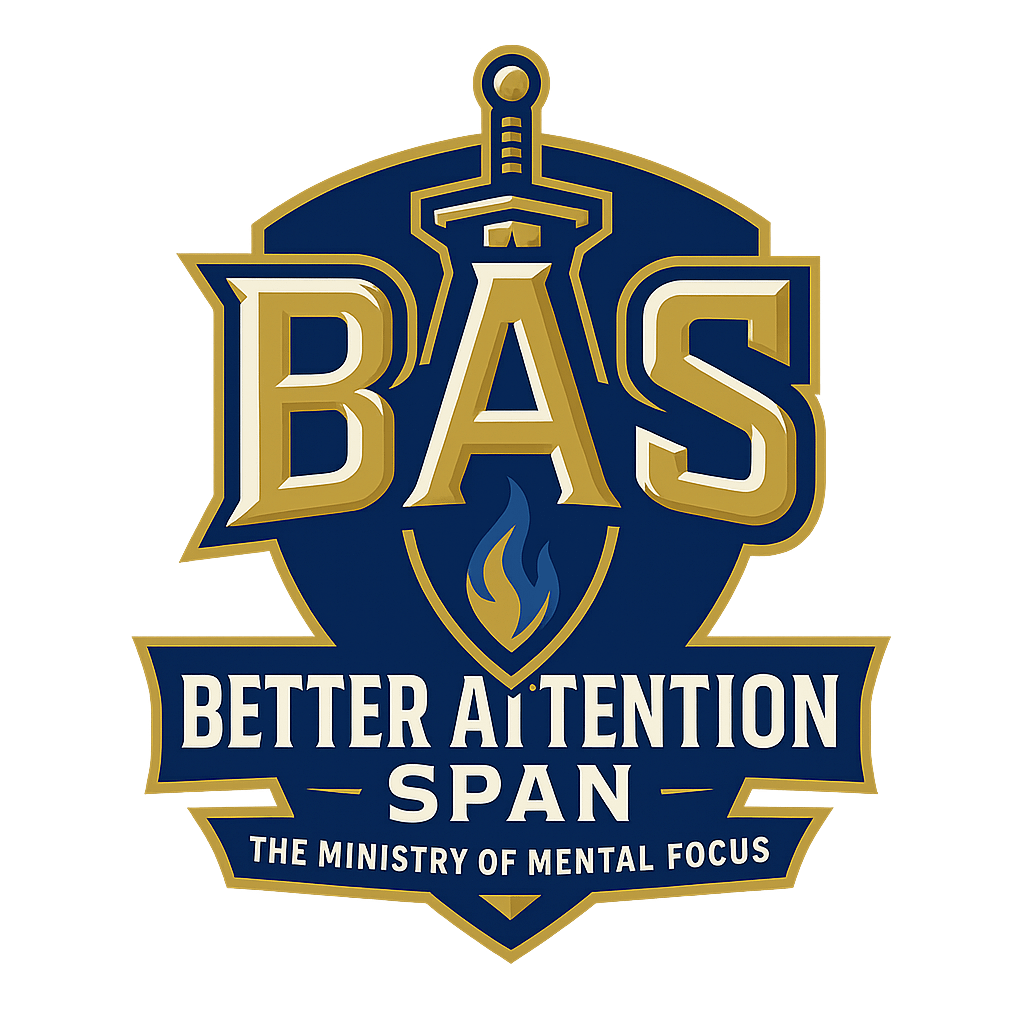Attention Span Training
How to Improve Your Attention Span by Building Strong Attention Skills Using Attention Training Exercises and Drills.
“The essential achievement of the will is to attend to a difficult object
and hold it fast before the mind .... Effort of attention is thus the essential
phenomenon of the will.” --William James
Mental exercises such as Attention Training Drills, Mental Concentration Training Drills, Mental Focus Training Drills, and Mindfulness Training Drills are a great choice for improving your attention span because they challenge the brain to focus and concentrate on specific tasks in fun and increasingly unique, challenging ways.
Attention, Concentration, Focus, and intuitive Mindful Exercises and Drills are form of "mental gym workout" that sets off an amazing process in your brain's biological machinery that unleashes nourishing chemicals to fuel the process of rewiring it for stronger attention demand in the future.
The Neuroscience Behind Mental Exerise to Improve Human Attention Spans.
By systematically flexing your attention in novel, unique ways, your brain responds positively through a process called Neurogenesis, which repairs existing brain cells, creates new brain cells, strengthens and expands intracellular networks for faster communication, and beefs up the neural pathways responsible for self-command and control.
How Mental Exercises Increase Your Attention Span.
The more attentional control you practice, the easier attention control and concentration become. Instead of getting bigger biceps from slinging iron, you get attention skills that allow you to carry heavier attention loads, handle a larger, ever-shifting variety of attention-heavy tasks, and do it for increasingly longer duration without becoming exhausted. You build physical muscle by strategic effort of repetitive muscular exertion. Similarly, Attention Control Training using practice drills and rehearsal routines as a scientifically supported approach to a better attention span.
Mental exercise is a direct-method discipline of cognitive training (as opposed to highly controversial digital technology based training). Direct-method brain training places you in direct, intimate contact with your attention so that you become thoroughly familiar with the way it works. You get to test its limits and possibilities, train it to work in all zones (internally and externally) and with any type of target. By addressing attention directly rather than reaching for a digital brain game that serves as go-between, you convert your attention into an always-accessible mental exercise equipment room wherein you cultivate control, endurance, flexibility, and strength at using attention to get maximum value from it.
How Do We Improve Our Attention Span? Through Simple, Daily Practice!
Studies have shown that consistent practice of mental exercises such as meditation, mindfulness, and cognitive training can lead to improvements in attention and cognitive functioning. For example, a study conducted by the University of California, Santa Barbara found that participants who engaged in a meditation practice for 8 weeks showed significant improvements in attentional control and cognitive flexibility.
A study published in the journal Frontiers in Human Neuroscience found that mindfulness attention training can improve cognitive control, which is the ability to sustain attention and inhibit distracting thoughts. Another study published in the Journal of Neuroscience found that meditation can increase the thickness of the prefrontal cortex, the area of the brain responsible for decision-making and attention.
Furthermore, practicing mental exercises can also help reduce stress and anxiety, which can often be a major distraction and hinder attention. By calming the mind and improving emotional regulation, we can learn to stay firmly, comfortably locked onto the chosen task at hand.
Practicing mental exercise drills to improve attention is a proven method for enhancing cognitive functioning and reducing distractibility.
Examples of mental exercise forms that can improve attention include:
1. Meditation Disciplines (religious, philosophical, or secular) - laser focus-demanding mental exercises are used extensively as a fundamental foundation in practicing mindfulness and many other forms of meditation, and they have been shown for thousands of years to improve attention and reduce distractibility. The problem with Meditation, however, is that it can take a really long time - months, or even years, and the agenda you're given may have absolutely nothing to do with the goal of using your Attention at will, for as long as needed, in any scenario, and have an enjoyable time doing it. Instead, your mediation choice may be all about something insubtantial and unproductive, although it brings your joy. Assess any meditative approach for its usefulness in directly improving your Attention Span with speed and efficiency. If you need to sit for years under a guru, fire them and start training yourself.
2. Brain games - playing intellectually-stimulating games that require focus, such as Chess, Sudoku or crossword puzzles, can help to improve attention and cognitive function. Non-digital brain games that involve physical interaction activate more areas of your brain and encourage higher levels of neurogenesis (stronger brain connections) than simple on-screen brain training games that do not require you to move, become physically involved, or interact socially with others. All brain games that add complexity and uniqueness help in this regard. The more involved your body is in the brain training process, the better.
3. Memory exercises - practicing memory exercises, such as memorizing lists or sequences, can help to improve attention and working memory. Working memory is used heavily in imagination-based attention training drills. The more time you spend exercising your working memory, the easier it is focus your attention. The more you focus your attention, the easier it is to access working memory for efficienty use.
4. Visual (observation) exercises - performing visual exercises, such as tracing patterns or focusing on specific objects, can help to improve attention to detail and visual processing. In addition to improving attention, mental exercises can also have other benefits such as reducing stress and anxiety, improving overall cognitive function, and enhancing memory retention.
5. Auditory (listening) exercises - includes mental training efforts that require you to concentrate your hearing onto a specific sound signal (a tone, beep, note, melody, voice, etc.), either to maintain attention target log on the auditory signal, or use your memory to recall it, or other action wherein you need to use voluntary attention to succeed in the task.
6. Gustatory (tasting) exercises - as with visual and auditory drills, taste-related attention drills place a high demand on attention to focus in on taste, texture, mouth feel, and other features of the eating and drinking experience. These drills will usually involve you narrowing in on the taste experience of something, and working with that experience to maintain, describe, re-imagine, or intentionally alter the effects using imagination. One gustatory exercise is to have various foods with their own unique flavor fed by mouth as you savor and identify them, or discuss the flavors of individual ingredients you detect, such as sweetness, fruitiness, or saltiness.
7. Olfactory (smell) exercises - our sense of smell is a wonderful attention training tool as we use our noses to improve attention skills. Odors make challenging, interesting attention training targets to follow because they change and compete with other scents. Identifying and keeping track of a scent, especially if it shifts and changes, requires subtle, flexible control over attention.
8. Kinesthic (touch) exercises - while gustatory and olfactory techniques tend to draw attention inward to the taste buds and nasal passages, your whole body is a receiving station for physical sensations that never stop, even when you're sleeping. Our sensitive central nervous system allows us to use the sensation of touch as a means of training attention to find a target, note its nature, and then stay there until commanded otherwise. Also, kinesthetic attention drills allow for a flexible use of attention as you can guide it all over your body to attend to any sensation. What's more, you can stretch and narrow the scope and scale of your attention to notice larger or smaller areas of bodily sensation.
9. Digital Brain Games - The supposed science of digital brain games is stacked two decades high, and in 2022 and 2023, a great many claims by Brain Game App Manufacturers have been questioned (if not flat out debunked) by recent scientific studies. Brain training tech companies like Luminosity have been dragged into court with multi-million-dollar lawsuits flying, and people who have high standing in the scientific community have found themselves with much to answer for when it comes to their role in years of pseudo-scientific claims promoted as unshakeable scientific fact. This controversy as to whether brain games are effective has been raging since before 2013 and isn't resolved. If anything, because digital technology is at the root of the current global attention span problem, digital brain games may become even more questionable in the future.
Until such controversies have been hammered out and technology providers start being more honest, no recommendations can be offered with confidence.
June 17, 2025
June 5, 2025
June 4, 2025
June 4, 2025
November 13, 2023

